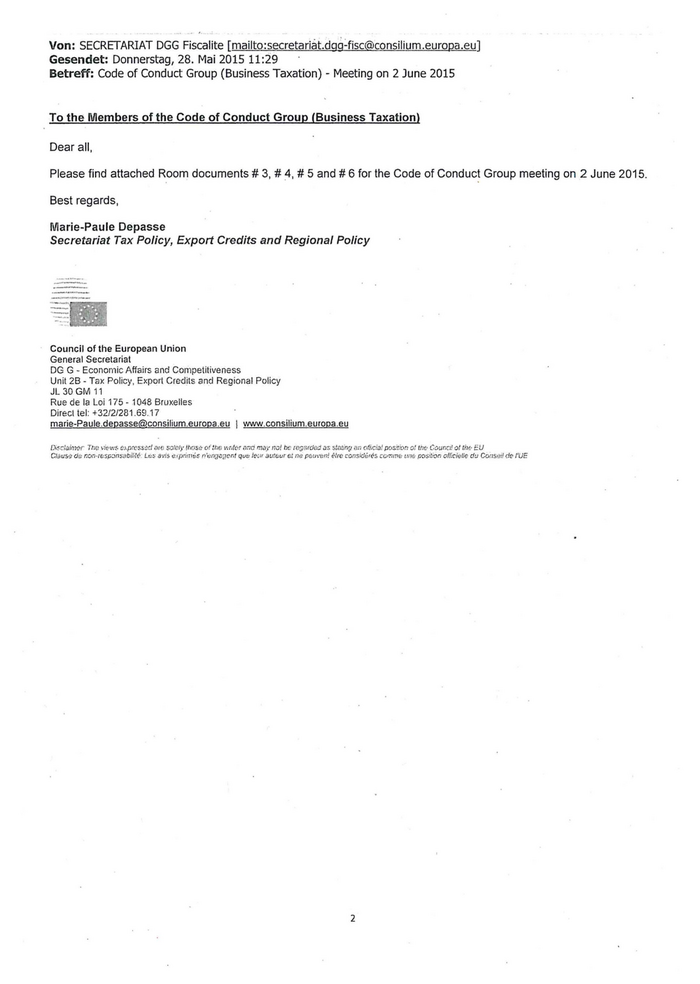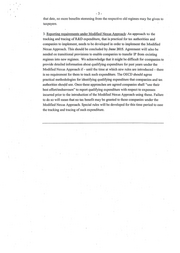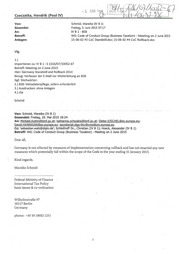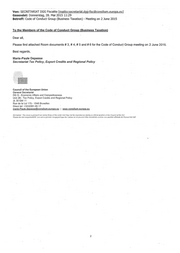coc-4
Dieses Dokument ist Teil der Anfrage „IFG: EU-Gruppe zu Code of Conduct (Business Taxation)“
r U, NO\', 2Qf( · ---~ -~ 'L~ ~- 0 . _' <_ ' ~(_v_ _ .!1~~ -~ ~ - ~ U 7 1 ( Müller, Mario (Pool IV) A ;--_~ ;_, .!-i - lO.A~ .Jo_~q .0~ ~ ./l Von: Hoeck, Alexander {IV B 1) Gesendet: Mittwoch, 5. November 2014 18:02 An: IV B 1- BSB Betreff: WG:·code of Conduct Group meeting on ~2 October 2014- German comments Vfg. 1.) Importieren zu : IV B 1-·s 1316/07/10052-61 Betreff: wie Betreff der E-Mail Hier: wie Betreff der E-Mail Bezug: Verfasser der E-Mail vor Weiterleitung an BSB 2.} Ausdrucken 3.) zSa Hoeck Von : Hoeck, Alexander (IV B 1) Gesendet : Mittwoch, 5. November 201417:28 An: Referat IVB2; Kiesewetter; Michael (IV B 2); Referat IVBS; Eimerrnann, Dieter (IV B 5); Referat IVC2; Staats Dr., Wendelin (IV C 2); Benecke, Andreas (IV C 2) Betreff: WG: Code of Conduct Group meeting on 22 October 2014- German comments Zur Info im Hinblick auf Ihre Mitwirkung. Vielen Dank nochmal und beste Grüße Alexander Hoeck Von : Hoeck, Alexander (IV B 1) Gesendet:: Mittwoch, 5. November 2014 17:26 · An : secretariat.dgg-fisc@consilium .europa.eu Ce: Schleithoff Dr., Christian (IV B 1); Schmid, Mareike (IV B 1) Betreff: Code of Conduct Group meeting on 22 October 2014 - German comments Dear Sirsand Madams, as a follow-up to the Code of Conduct Group meeting on 22 October 2014 we would like to take the opportunity and confirm that Germanv would be pleased to take part in a separate Group meeting on the Commission Services' approach to t he application of criterion 4 in the draft assessments of patent bo>tes {as described in Room Document #3 for the above mentioned meeting) . . Besides, Member States have been asked to su_bmit their views on the following issue : Work pacl<age 2011- Monitoring Guidance on .lnbound Profits {Questions in Room Document #21). Piease find the German comments below.

Do MS regard the toolbox outlined in Annex 1 as an appropriate starting point for further work'! - Yes. Do MS agree that the key componcnts listed in column B may gencrally be implemcnted by at least onc of the measures listed in column C levell? - Yes. Which of the tools listed "in .column C Ievel 2 require further clarification .for the purpose of effcctively ensuring inbourid taxation?- None. o DoMS have suggcstions for effectiveness criteria (column D)?- No. Thanks and regards, Alex Alexander Hoeck Counsellor International Ta>: Policy Federal IViinistrv of Fini)nce Wilhelmstr. 97, 10Ü7 Berlin, Germany Phone : +49 30 18 682-2226 Fax: +49 30 18 682-882226 email: alexander.hoeck@bmf.bund .de 2

.. ' ZLI~(~.: { __ _Vf.Y._l.--j_(_!_~((~..f.~.!Jl~-~~- ~ L ) Viüller, Mario (Pool IV) · L-0. (. - ~!~·. .lQa~. _;o~11Jl{.l Von: Schmld, Mareike (IV B 1) Gesendet : Freitag, 14. November 2014 08:10 An: NB 1- BSB Betreff: WG: Code of Conduct Group Meeting 20 November 2014: Joint Compromise Proposal by the UK and Germany on the Nexus Approach Anlagen: 14 1113 Germany UK Joint Paper on Nexus.pdf Vfg. 1.) Importieren zu: IV B 1- S 1316/07/10052-63 Betreff: Code of Conduct Group Meeting 20 November 2014 Hier: Joint Compromise Proposal by the UK and Germany on the Nexus Approach "!zug: Hoeck (IV B 1)- Sekretariat EU vgf. Stichwörter: 2.) BSB: Metadatenpflege, sofern erforderlich 3.) Ausdrucken 4.) zSa Schmid -----Ursprüngliche Nachricht----- Von : Hoec~, Alexander (IV B 1) Gesendet: Donnerstag, 13. November 2014 15:04 An: secretariat.dgg-fisc@consilium .europa.eu; -Wolfgang.nolz@ bmf.gv .at; Michael. Kuttin@ bmf.gv .at Ce: Kreienbaum, Martin (IV B); Schleithoff Dr., Christian (IV B 1); Schmid, Mareike (_IV B 1); Fergus.Harradence@hmtreasury.gsi.gov.uk; 'Zoe.Leung-Hubbard@HMTreasury.gsi.gov.uk'; Williams, Mike " HMT 1ike.Williams@hmtreasury.gsi.gov.uk); 'sebastian.walz@diplo.de'; Oieter Kischel (dieter.kischel@ec.europa .eu) oetreff: Code of Conduct Group Meeting 20 November 2014: Joint Compromise Proposal by the UK and Germany on · the Nexus Approach Dear all, Piease find attached on behalf of Mr Mike Williams and Mr Martin Kreienbaum a Joint Compromise Proposal by the UK and Germany on the Nexus Approach for consideration at the upcoming Code of Conc;iuct Group meeting on 20 November 2014. Would you please be so kind and provide the participants with the document. The UK and German delegates would be happy to give abrief verbal introduction into the document du ring the meeting. Thanks and regards, Alex 1

A?exander Hoeck Counsellor International Tax Policy Federal Ministry of Finance Wilhelmstr. 97, 10117 Berlin, Germany Phone: +49 30 18 682-2226 Fax: +49 30 18 682-882226 email : alexander.hoeck@bmf.bund .de 2

., Compromise Proposal on Modified Nexus Approach Origin: Germany/United Kingdom Date: 13 November 2014 This paper, which has been jointly agreed between Germany and the UK, aims at taking the discussion on the Nexus Approach forward, by settingout a compr(n:nise proposal. Tbis would enable further progress to be made in relation to ensuring econornic substance within preferential tax regimes (BEPS Action 5 and work wi~tin the EU Code ofConduct Group). Germany and tbe UK bave co-operated to develop a joint proposal for the consideration of the G20 and OECD member countries in tbe FHTP. Tbi·s aims to resolve tbe .concems countries bave expressed about some features ofthe Modified Nexus Approach, and identify what further work is required in order to enable agreement to be reacbed on this issue during 2015. Concerns bave been expressed about how to calculate qualifying R&D expenditure, transitional arrangements between regimes and time allowed for this tbrougb grandfathering provisions, and tbe ttacking and tracing methodology for R&D expe~diture that will determine whether it qualifies. The proposal is based on the following elements, which seek to address the concerns tbat have been raised, whilst reinforcin~ tbe nexus approach and providing safeguards against profit shifting. These also airn to ensure that the approacb to implementing new rules is consistent witb existing OECD rules on the phasing out ofharmful iegirnes. A) T he Modified Nexus Approach - conceptual issues ] . Nexus Approach: General acceptance oftbe Modified Nexus Approach as presented in tbe OECD Report on Action 5, but requiring further modifications relating to the Ievel of qualifying expenditure, grandfatbering provisions and the tracking and tracing of expenditure: 2. Up-lift: Under the currently proposed ·Modified Nexus Approach, businesses using already existing Patent Boxregimes might sec a reduction in income receiving preferential treatment, as R&D expenditure to develop the patent must be undertaken in a more limited number of entities, including tbe ·company holding the relevant patent, to qualify. This could impose restructuring costs on groups which have dedicated R&D companies in order for them to retain the relief in future. Furthermore, to disregard any IP acquisition costs at all might have an impact on commercial decisions. To reflect these concems raised by businesses, countries may allow for an · up-lift of qualifying expenditure within the Modified Nexus Approach. However, one

. -2- needs to take into account that the very conceptual basis oftbe Modified Nexus Approach is intended to ensure that, in order for a significant proportion of IP income to qualify for benefits, a significant proportion ofthe actual R&D activities must have been undertaken by tbe gualifying taxpayer itself. Accordingly, such up-lift needs to be restricted. Jt may only be granted to tbe extent thal expenditure in the context of outsourcing and acquisitions .has actually taken place, and it is in any case limited to a certain percentage ofthe qualifying expenses ofthe respective company: 30%. This percentage-based Iimitation relates to the overall amount ofboth, outsourcing and acquisition costs. Example (1): Parent company incurred qualified expenses of I 00, parent company inctirred costs for acquisition of IP assets of I 0, · subsidiary company incurred R&D expenses of 40. 9 Maximum up-lift amount = 100 x 30 % = 30 9 . Overall qualifying expenses including a limited percentage of outsourcing and acquisition costs = 130 Example (2): Parent company incurred qualified expenses of 100, parent company incurred costs for acquisition of IP assets of 5, subsidiary company incurred R&D expenses of20. 9 Maximum up-lift amount = 100 x 30 % = 30 c:> Overall qualifying expenses including a limited percentage of outsourcing and acquisition cost~ = 125 B) Timing, grandfathering and reporting issues 1. Close oldregime to new entrants: Countries will have tobring their current rules in line with the Modified Nexus Approach by a specific date wbicb will be tbe same for all countries. That means tbat there can be no new entrants to tbe respective old rules after tbat date ("closure to new entrants date"). We acknowledge that countrieswill need some time for the respective legislative process, so a suitable date would be 30 June 2016. 2. Final abolition öf old regime: In order to give protection for taxpayers benefitting fi:om the existing regimes, countries are allowed to introduce grandfalbering rules. Under such rules, all taxpayers benefitting from an old regime may keep such entitlement until a second specific date ("abolition date"). Tbe period between tbe two dates should not exceed 5 years (so the abolition date would be 30 June 2021 ). After

- 3- that date, no more benefits stenmüng from the respective old regimes may be given to taxpayers. 3. Reporting reguirernents under Modified Nexus Approach: An approach to· the tracking and tracing of R&D expenditure, that is practical for tax authorities and companies to implement, needs to be developed . in order to . implement the Modified Nexus Approach. Tbis sbould be concluded by J une 2015. Agreement will also be needed on transitional provisions to enable companies to transfer IP from existing regin~es into new regimes. We ac~owledge tbat it migbt be difficult for companies to provide detailed information about qualifying expenditure for past years under the Modified Nexus Approach if- until the time at which new rules are introduced- tbere is no requiremenffor them to tracksuch expenditure. The OECD sbould agree practical methodolog}es for identifying qualifying expenditure that companies and tax authorities shou}d use. Once tbese approacbes are agreed companies shall "use their best efforUendeavours" to report qualifying expenditure with respect to expenses incurred prior to the introduction' ofthe Modified Nexus Approach using these. Failure to do so will mean tbat no tax benefit may be granted to those companies under tbe Modified Nexus Approach. Special rules will be developed for this time period to ease the tracking and tracing of such expenditure.


Czeczatka, Hendrik {Pool IV) Von: Schmid, Mareike (IV B 1) Gesendet: Freitag, 5. Juni 2015 07:17 An: IV B 1- BSB Betreff: WG : Code of Conduct Group (Business Taxation) - Meeting on 2 June 2015 Anlagen: 15-06-02 #3 CoC Standstill.doc; 15-06-02 #4 CoC Rollback.doc Vfg. 1.) Importieren zu : IV B 1- S 1316/07/10052-67 Betreff: Meeting on 2 June 2015 Hier: Germany Standstilland Rollback 2014 Bezug: Verfasser de r E-Mail vor Weiterleitung an BSB Ggf. Stichwörter: 2.) BSB: Metadaten pflege, sofern erforderlich 3.) Ausdrucken: ohne Anlagen 4.) zSa Schmid Von: Schmid, Mareike (IV B 1) Gesendet: Freitag, 29. Mai 2015 18:24 An: Michaei.Kuttin@bmf.gv.at; katharina.schwaha@bmf.gv.at; Dieter.KISCHEL@ec.europa.eu; David.HANNIGAN@ec.europa.eu; secretariat.dgg-fisc@consilium.europa.eu Ce: 'sebastian.walz@diplo.de'; Schleithoff Dr., Christian (IV B 1); Hoeck, Alexander (IV B 1) Betreff: WG: Code of Cönduct Group (Business Taxation)- Meeting on 2 June 2015 Dear all, Germany is not affected by measures of implementation concerning rollback and has not enacted any new measures which potentially fall within the scope of the Code in the year ending 31 January 2015. IUnd regards, Mareike Schmid Federal Ministry of Finance International Tax Policy basic issues & co-ordination Wilhelmstraße 97 10117 Berlin Germany phone: +49 30 18682 1251 1
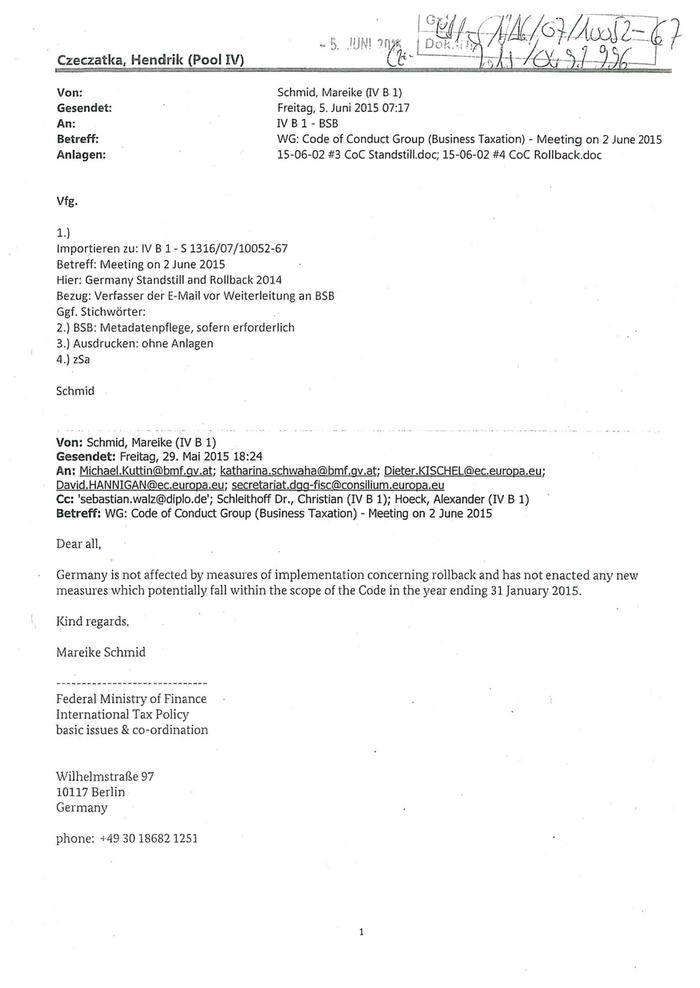
Von: SECRETARIAT DGG Fiscalite [mailto:secretariat.dgg~fisc@consilium.europa.eu] Gesendet: Donnerstag, 28. Mai 2015 11:29 Betreff: Code of Conduct Group (Business Taxation) - Meeting on 2 June 2015 To the Members of the Code of Conduct Group (Business Taxation) Dear all, Piease find attached Room documents # 3, # 4, # 5 and # 6 for the Code of Conduc~ Group meeting an 2 June 2015. Best regards , Marie-Paule Depasse Secretariat Tax Po/icy, Export Credits and Regional Po/icy Council of the European Union General Secretariat DG G - Econ omic Affai rs and Competitive ness Un it 2B- Tax Policy , Export Credits and Regional Policy JL 30 Gllll1 1 Rue de Ia Loi 17 5 - 1048 Bruxelles Direct tel: +32/2/281 .69.17 marie-Paule .depasse@consilium.europa.eu 1 www.consilium.europa .eu lJ.sC:aim~r T!:e \.iews e"p:ess~ ate sv!ely tttOsf: of the wnte! and tniJ)' Ho! be mu~:;rde;; as s:atinfJ a:: off:ciaf posft!on o: the C;)ur.n! ol riu·. EU c:ous-3 de norHf:S{XJnsabilite· Le;s s·tis t:.-:p:im 6s n't:tlfja;,cn f que I~ur aut&ur et ne p&tn'eni eire cotJsidi:res comm& w1& position cff:cieffe du Co;;sei! rle I'UE 2
